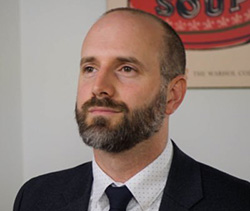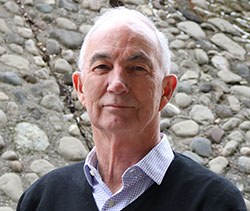
Click here to join the Zoom Webinar: https://westernuniversity.zoom.us/j/95000084425#success
Abstract
Climate change is evident in London, throughout North America, and around the world. Assessing its impacts on agriculture, water, and the economy is essential to setting sound national and global targets that minimize the costs and maximize the benefits of both adaptation and mitigation. Conventional wisdom suggests impacts are expected to scale with atmospheric concentrations. Here, I explore the relationship between global temperature targets — typically expressed in degrees Celsius, from +2 to +4—and projected future changes in a series of regional impact-relevant metrics, from drought to energy demand, to answer the question: To what extent do differences in global targets translate into differences in impacts locally?
Panelists

Mike Fabro, M.E.B., P.Eng.
Manager, Sustainability and Resiliency
Long Range Planning and Sustainability
City Planning, City of London
After more than a decade working as an environmental engineering consultant in Alberta and Ontario where he assisted clients with site assessment, brownfield redevelopment and climate adaptation planning, Mike recently shifted his focus to municipal sustainability and resilience. Mike’s role at the City of London includes working with an interdisciplinary team to develop London’s Climate Emergency Action Plan, create and implement a climate emergency evaluation tool and deliver on Council resolutions relating to the City’s response to the declared climate emergency. Mike is also responsible for managing and supporting ecologist planners developing and implementing policies, guidelines and programs to plan for and manage London’s natural heritage resources, including London’s Environmentally Significant Areas.

Genevieve Langille
Student Climate Change Activist in London, Ontario
Genevieve Langille is a seventeen-year old student and a co-organizer of the London, Ontario protests demanding action on the climate crisis, which had thousands of attendees before the pandemic. For leading these protests, she has been featured on the front page of the London Free Press, interviewed by CTV, Rogers News, the Western Gazette, CBC radio and numerous other news media. Additionally, she has spoken about anthropogenic climate change on panels at Wolf Performance Hall, Hyland Cinema and town halls. She aspires to study international relations and is entering university next year.

Gordon McBean, C.M., O.Ont, PhD, FRSC
Director of policy at the Institute for Catastrophic Loss Reduction
Professor Emeritus
Department of Geography & Environment
Professor Emeritus Gordon McBean is Director of Policy, Institute for Catastrophic Loss Reduction and in Department of Geography and Environment at Western University. He was President, International Council for Science (2014-18). Previously, he was Assistant Deputy Minister, Environment Canada (1994-2000), responsible for weather, climate and air quality sciences and service. Since his appointments to ICLR and Western, he has focused on science and policy issues of climate change, disaster risk reduction and broader environmental issues. He is a Member of the Orders of Canada and Ontario and Fellow of the Royal Society of Canada. In 2007 he was awarded the Nobel Peace Prize, shared for his contributions to the IPCC.

Natalie Merchant, MES, BSc
Sustainability Coordinator for Green Economy London
Natalie is a passionate advocate for sustainability and environmental stewardship. Growing up in Thunder Bay surrounded by vast forests and lakes, she is constantly reminded of nature’s astounding beauty, value, and the use we can make of it. She believes healthy environments are essential for healthy communities, and wants to help build and promote sustainable practices to ensure healthy environments for future generations.
Natalie recently completed her Masters at Western University in Environment and Sustainability (MES) and has a degree in biology specializing in conservation and biodiversity. Her work at Green Economy London focuses on helping local businesses reduce their environmental impact, by helping them set reduction targets, creating action plans to achieve those reductions, and bringing together a network of business leaders that are taking sustainability initiatives and celebrating their successes.

